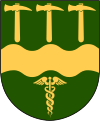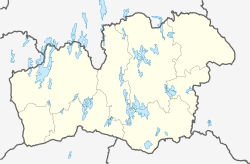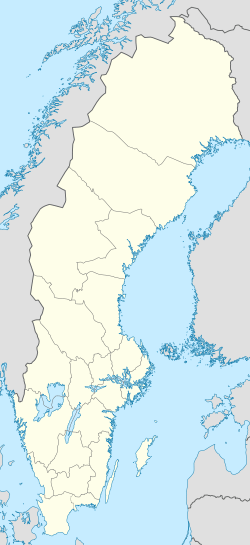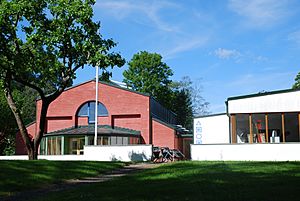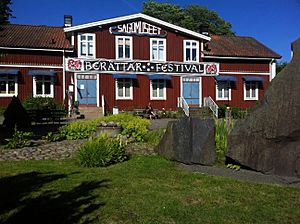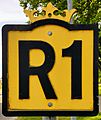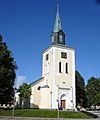Ljungby facts for kids
Quick facts for kids
Ljungby
|
||
|---|---|---|
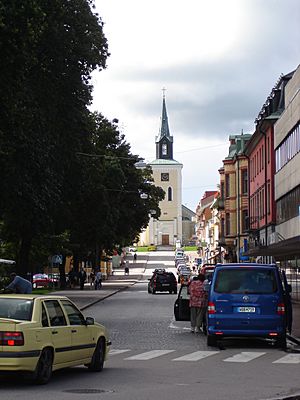
Storgatan with Ljungby Church in the background.
|
||
|
||
| Country | Sweden | |
| Province | Småland | |
| County | Kronoberg County | |
| Municipality | Ljungby Municipality | |
| Area | ||
| • Total | 11.93 km2 (4.61 sq mi) | |
| Population
(31 December 2010)
|
||
| • Total | 15,205 | |
| • Density | 1,274/km2 (3,300/sq mi) | |
| Time zone | UTC+1 (CET) | |
| • Summer (DST) | UTC+2 (CEST) | |
Ljungby is a town in Sweden. It is located in Kronoberg County. Ljungby is the main town of Ljungby Municipality. In 2015, about 15,785 people lived here.
Contents
History of Ljungby
Ljungby has a long and interesting history. People have lived in this area for many centuries.
Early History of Ljungby (11th Century to 1828)
The first known people in the Ljungby area were Astrad and Götrad. They lived during the Viking Age in the 11th century. We know about them from a runestone called The Replösa Stone. Götrad made this stone for his father, Astrad.
A stone church was built here in the 12th century. This happened when the Ljungby parish was created.
In the 14th century, a special inn was built in Ljungby. The king ordered it to be built. Ljungby was a good spot for an inn because two important trade routes crossed there.
During the 17th and 18th centuries, a woman named Märta Ljungberg owned the inn. She earned a lot of money from it. Märta used some of her money to buy twelve other farms. The town of Ljungby was later built on these farms.
By the early 1800s, a new town was needed in the Sunnerbo hundred area. Two places were considered: Berga and Ljungby. Ljungby was chosen because it was more central. It also had better road connections.
Ljungby Becomes a Town (1828 to Today)
Around 1828 to 1830, Ljungby became a friköping. This was a type of smaller town. It did not have all the special town privileges of a formal town. The new town of Ljungby was built on the land Märta Ljungberg had donated.
In 1878, the first railroad came to Ljungby. It connected Ljungby to Vislanda and Bolmen. Over time, it linked to other railroads. You could travel to Karlshamn in the east and Halmstad in the west. In 1899, a new north-south railroad opened. It was called the Skåne–Smålands Railroad.
During the 20th century, Ljungby grew a lot. This was thanks to its workshops and wood industry. The biggest growth happened between 1940 and 1960.
A large town fire happened in Ljungby in 1953. It was during the night of July 4th to 5th. The fire damaged twenty buildings. Thirty families lost their homes. Also, 96 people lost their jobs.
In 1970, the Karlshamn–Vislanda–Bolmens Railroad closed. Fewer goods were sent by train. Lorries started to transport more cargo instead.
The last train left Ljungby in 1997. This was when the cargo route from Helmershus to Ljungby ended. After the railroad tracks were removed, many parts became bicycle paths.
Ljungby's first college opened in 2002. It is called Högskolecentrum Ljungby. It works with three nearby universities. These are Linnaeus University, Jönköping University, and Halmstad University.
Culture in Ljungby
Ljungby has been home to many creative people. These include the cinematographer Gunnar Fischer. Writers like Folke Fridell, Lennart Williams, and Sölve Rydell also lived here. Ljungby also has two museums, a library, a theater, and a cinema.
The Ljungberg Museum
Ljungbergmuseet, or The Ljungberg Museum, is an art museum in Ljungby. It always shows paintings by Sven Ljungberg and his wife Ann Margret Dahlquist-Ljungberg. The museum also has special temporary exhibitions by other artists.
The museum was built in 1990 and made bigger in 2002. The architect Pontus Ljungberg designed it. Pontus Ljungberg is the son of Sven Ljungberg and Ann Margret Dahlquist-Ljungberg.
In 2012, the museum became Kronoberg's official museum for visual art.
The Museum of Legends
Sagomuseet, or The Museum of Legends, is a museum about folklore in Ljungby. It shares old legends and fairytales. These stories have been told in Ljungby and Kronoberg for a long time. The museum has also put up signs around Kronoberg that tell stories about different places.
Every year, the museum hosts a storytelling festival called Berättarfestivalen. During this festival, people gather to hear storytellers from all over the world.
In 2013, the owners of The Museum of Legends became advisors to Swedish UNESCO. They advise on intangible cultural heritage.
Ljungby Library
Ljungby kommunbibliotek, or Ljungby library, is a popular place. Between 500 and 800 people visit it every day. The library also has a café and a small art gallery. The current library building was built in 1982. However, Ljungby has had libraries since 1920.
Ljungby library also manages smaller libraries. These are located in Lagan, Ryssby, and Lidhult. The Ljungby library also has a mobile library. This is a bus filled with bookshelves. They use this bus to reach people in smaller towns around Ljungby Municipality.
Images for kids
-
The cinematographer Gunnar Fischer (Operating the camera) was born in Ljungby.
 | Isaac Myers |
 | D. Hamilton Jackson |
 | A. Philip Randolph |


